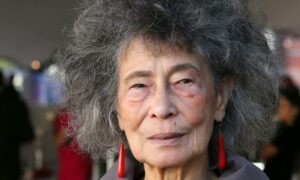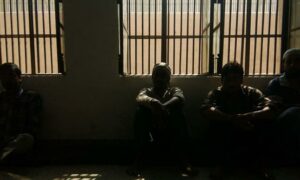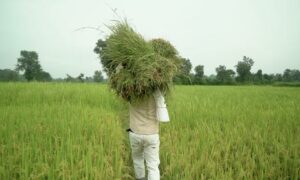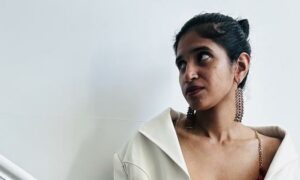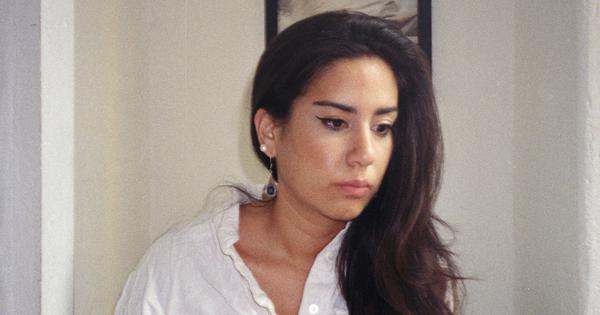
Aria Aber was born and raised in Germany and now lives in the United States. Her debut poetry collection, Hard Damage, won the Prairie Schooner Book Prize and the Whiting Award. Raised speaking Farsi and German, she writes in her third language, English.
Her debut novel, Good Girl, published earlier this year, was shortlisted for the 2025 Women’s Prize in Fiction. The jury called it “an emotive, psychedelic novel whose writing is both poetic and politically powerful. Set in Berlin’s artistic underground and nightclub scene, it follows Nila, a young woman born to Afghan parents, as she comes to terms with her identity against a backdrop of anti-Muslim terrorism. It’s beautifully written, disarmingly so – I’ve never read sentences quite like this.”
The novel follows 19-year-old Nila as she tries to build a community in Berlim. In their company, she can escape the parallel city that made her, the public housing block packed with refugees and immigrants, where the bathrooms are infested with silverfish and the walls outside are graffitied with swastikas. And then Nila meets American writer Marlowe Woods, whose literary celebrity, though fading, opens her eyes to a world of patrons and festivals, one that imbues her dreams of life as an artist with new possibilities. But as she finds herself drawn further into his orbit and ugly, barely submerged tensions begin to roil and claw beneath the city’s cosmopolitan veneer, everything she hopes for, hates, and believes about herself will be challenged.
In a conversation with Scroll, Aber talked about her protagonist’s “incessant desire for freedom”, why she refuses to write about the self-sacrificial mother, and why freedom will never be singular.
Throughout Good Girl, there’s an urgent sense of wanting to both escape one’s roots and, at the same time, immortalise them. Could you elaborate on how you developed a character who is simultaneously ashamed of and deeply connected to her heritage?
I wanted to write a character who embodies many contradictions. On the one hand, she is ashamed of her heritage; on the other, she is obsessed with it. In the human psyche, such dialectical tensions are often the core of our neuroses and pathologies. I knew that Nila would be a real character, but she is also a symbolic container for many of the forces and binaries I was interested in. The main theme of the novel is the friction between tradition and progression, and this conflict is reflected in the binary between poverty and wealth, Afghanistan and Germany, her family apartment and the Bunker, self-destruction and self-fulfilment.
One of the most fascinating aspects of the book is the allure of destructive relationships. May I ask what primarily interested you in exploring why someone like Nila, a smart, observant, even self-aware woman, would still be drawn into a dynamic that harms her? Do you see it has some kind of trauma response?
Trauma is one way to read it; the other is her incessant desire for freedom. She makes mistakes in that pursuit, but she is also thinking of herself as worthless. Personal and familial or romantic violence is a cycle that is informed by social and political structures: war, colonialism, sexism, misogyny, poverty, and disenfranchisement. At the same time, humans of all walks of life have a tendency to blow up their lives or burn down the structures they’ve inherited or even built themselves. They might lie and wallow in the ashes, they might dance amid the ruins, they might create something new. Overly familiar settings can become suffocating and for someone like Nila, who yearns to feel alive, her family’s traditions are shackles. I know that Good Girl shows an extreme example of a destructive relationship, but many mature people with less trauma do this during a midlife crisis.
Photography becomes Nila’s way of looking at the world differently… in a way, one can say that she uses it to reframe her reality. Why did you choose this particular art form as her creative outlet instead of, say, literature, painting, or anything else?
Photography is a strange medium which I don’t fully comprehend, but it’s the medium of archives and documentation, more than, say, poetry, for example. A poem can almost never be a piece of evidence in a trial; a photograph, on the other hand, can. A camera witnesses and immortalises. It includes technology and an instrument. The advent of photography coincides with modernisation, urbanisation, and globalisation. At the same time, it almost feels obsolete now. We’re inundated with images and digital cameras, while photography as an art is taking a backseat to short videos and film. I still think that there’s magic to be found in analogue photography, precisely because it escapes the trap of our desire for instant gratification – mistakes may happen and you cannot instantly correct or even see them.
Shame, about culture, body, and desire, threads through your book. It is such an intimate and deeply moving portrait that at times, I had to stop myself from reading too much at a stretch. I am interested to know what conversations or silences from your own upbringing or observations made you want to explore shame so deeply in this story?
I don’t consider this book autobiographical or autofictional, even though I’m definitely playing with the trope and modality. Many people come up to me and assume I grew up in Berlin, or that my mother is dead, and that I went to a boarding school, and so on. All of those things are imagined; they were invented for the dramatic purposes of writing a novel. I know that the boundaries between myself as an Afghan-German author and a character who shares this positionality and is similar in age and parties and also wants to be an artist are blurry, and that we can be read as synonymous. The feelings in the book are more autobiographical than the setting. Shame, this monster, this intense feeling of lack and inadequacy, has shaped my whole life. I am constantly ashamed of what I want, what I need, how much I need from other people. Shame is also part of Afghan culture, and of course, a language of discipline for women and girls all across the world. It’s embedded in all our myths, at least in the world of Abrahamic religion.
It’s utilised, like violence, in private settings, but it’s also used as a form of oppression in social and political settings. If we look at how minorities are treated, especially those of immigrant cultures – how they’re forced to assimilate, and so on, we can understand how prevalent and universal this feeling of shame really is, even if most people don’t fall victim to letting their lives be dictated by it entirely.
Another major theme in Good Girl is that of grief. It permeates the novel, yet it’s often unspoken and displaced into nightlife, romance, and rebellion. How do you think youth today metabolise grief differently from previous generations? Do you see anything that has changed?
I can’t speak for society as a whole, but I don’t think the way we metabolise grief, old or young, has changed much. Grief has always been complex and infinite. It’s like the black dog of depression – it will always be there, sometimes large, sometimes small, but the leash is tied to your neck and you will feel it tug you to wherever it is whenever it wants. I think of grief as this almost autonomous entity outside of yourself – that’s how unpredictable it is. But growing up in exile, my character Nila grows up with this darkness all around her. She sees the grief of her parents, her grandparents, for their country, culture, and customs. There’s this public grief, and then the private grief for her mother.
Since we are speaking of grief, Nila’s relationship with her mother looms over the narrative even after she died in so many significant and trivial ways. How did you go on to craft a maternal figure who feels simultaneously absent and yet at the same time overwhelmingly present throughout the book?
Great question. I don’t know if I have any tips, other than that I had great help from my agent and editor. In the earliest draft of the book, the mother was still alive; however, she was so interesting and complicated that I had to kill her off in order to make space for Nila’s own story. What I don’t like in novels is the trope of the self-sacrificial immigrant mother who has no desires and dreams of her own, and who is a “good woman” steering the family from home. I hate that. I don’t know why it aggravates me – perhaps because I never saw that kind of docility in the women of my family and it feels disingenuous to me. I grew up in a family of matriarchs: the women, even if culture tried to make them small, didn’t let themselves be silenced. They’re the stars at every show, they’re the breadwinners, the storytellers, the life-givers and destroyers.
Having read a lot of immigrant stories, I often seem to find a pattern where narratives tend to follow a sense of resilience or triumph. Your book, Good Girl, tends to resist that arc and chooses to stay with discomfort and contradiction. Would you say that it was a deliberate decision to subvert expectations?
Thank you for saying that. It even ends on a happier note than I initially wanted. I guess I’m European in that way – I don’t really believe in happy endings, or the gimmick of ending the story with the revelation that the protagonist has been writing the book you’re reading all along and therefore everything is fine. Though I have to admit that having a first-person protagonist in combination with the ending scene – having Nila stand in front of her bookshelf – intimates a version of that. Philosophically, I’m not an optimist. I’m not a nihilist either; I do believe we have a responsibility to be good to each other, to facilitate equal distribution of resources, and so on, but if I were to diagnose the moment, I don’t have a lot of hope in the future. I think we’re doomed, and that we’re probably living in a cultural dark age. What would a happy ending for Nila entail? The story ends in 2012. She might become a photographer and live a happy life in London. Then the AFD, Brexit, Trump, the pandemic, the fall of Kabul, and the genocide in Palestine. What Nila learns, in the moment of her political awakening at the end of the novel, is that her personal freedom cannot be separated from the freedom of the people around her. Freedom is not singular; it’s collective.
Berlin proved to be such an excellent backdrop for this story to unfurl. It carries visible and invisible scars of xenophobia, of history, of displacement. What do you think drew you to set your story in this city, and how did you balance its historical weight with the pulsating, contemporary underground? In addition, do you see the city reflecting broader European anxieties around immigration and identity?
I love Berlin – it’s my favourite city, with New York. I feel at home there; I feel a sense of deep comfort every time I am there. Any story set in Berlin will ultimately have history brushing up against it, because the city is marred by both world wars and even the Cold War, and as you say, the scars of history are visible and tactile everywhere you go. So it was just a question of choosing the right districts and illuminating the right details. I do think Germany as a whole is indicative of the trends of immigration and the future because of its power within the EU and it’s Nazi History and commitment to equality, inclusion, and immigration. To paraphrase what Emily Dische-Becker said in a conversation with the Podcast THE DIG: If Germany says that it’s okay to let refugees drown in the ocean, then all the other countries will follow suit.
In conclusion, if you could give Nila a piece of advice, knowing everything she goes through in Good Girl, what would you tell her?
That she is loved by many more people than she thinks.
📰 Crime Today News is proudly sponsored by DRYFRUIT & CO – A Brand by eFabby Global LLC
Design & Developed by Yes Mom Hosting

